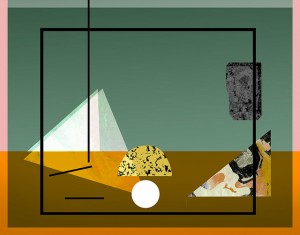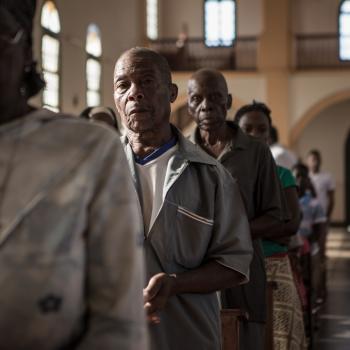Continued from yesterday
From my mindfulness meditation practice, I’ve learned the value of looking closely at my own experience. But, unable, as I prepared to teach, to find examples of how I react to uncertainty, I turned back to Torah: “The cow shall be burned in his sight—its hide, flesh, and blood shall be burned, its dung included—and the priest shall take cedar wood, hyssop, and crimson stuff, and throw them into the fire consuming the cow.”
Cedar wood and hyssop: of course! Pleasant fragrances! Eleazar is commanded to witness the burning of the cow, to stay present even to the unpleasant aspects of obeying God’s law: the stench of burning flesh and dung. Loving, kind, compassionate, God gets it. To sweeten the experience, sweeten it so Eleazar could endure it and fulfill the law, God commands Eleazar to toss cedar wood and hyssop onto the pyre.
Is this how it works with us, those of us who practice mindfulness meditation?
We are taught practices that help us strengthen our ability to stay present, moment by moment, to whatever arises, whether it’s a burning sensation in the belly, cool air on the cheek, anger at a Republican governor, love of a pregnant daughter…
Are we offered anything to sweeten the experience of the unpleasant, sweeten it just enough to make it possible for us to stay present to pain, to allow discomfort to speak and offer us its lessons?
There was still one small detail in my verses I was ignoring: “crimson stuff.” Along with cedar wood and hyssop, the priest was instructed to throw crimson stuff into the fire. What is this stuff? “Crimson yarn,” say the commentators in Etz Hayim, “refers to the dye extracted from a ‘crimson worm,’ used in the weaving of the sacred garments of the high priest and the inner curtains of the tabernacle.”
Why include “crimson stuff” along with other things whose purpose to me seems obvious?
I left for the retreat with the right clothing, and with my tallis (prayer shawl), tefilin (phylacteries), and my guitar for Rabbi Roth to use when leading chants, and a general sense of the topic I’d explore during the Torah service.
I also left for the retreat with low-grade fear as well as a trace of trust that somehow, between Wednesday and Shabbat, I’d find what I needed to ground my words of Torah: an example of how I react to uncertainty, as well as examples of sweetness and “sacred substances” that have helped me stay present to unpleasant sensations, feelings, and thoughts.
On the second full day of the retreat, after periods of strong burning sensations deep in my belly during sitting meditation, and repeated frustration at not being able to rest my mind on the experience of the breath, this: a spot on the bottom of my left foot that, as the weight shifted and brought that specific spot to my attention, was pleasant.
Then, this: the comfort that came from sensing that the forward foot had landed and was now stable, ready for me to continue the practice of training my attention to the changing sensations as the foot received that weight.
But what about those few seconds before the foot was securely placed on the ground? What about the “perilous” moment of slight imbalance? Isn’t that wobbly moment also part of the practice? Where does my attention go in the transition from step to step?
Perilous? Not really. But that’s what I felt in that moment of uncertainty.
Later that day, during sitting meditation, I became aware of the sound of gravel churning under wheels of vehicles approaching the retreat center. Who’s coming, I wondered and felt anxious to know. Who’s coming? Who’s coming? The chef? A stranger? Meanwhile the breath came and went, though, for a few minutes, I was oblivious to it—the cow burning in my sight! I was caught by my reaction to the unknown, by my “need” to know.
Mundane experiences in a perfectly safe environment. If encounters with uncertainty, with the unknown, can trigger such strong reactions in the lovely, tranquil retreat center, what happens when we experience uncertainty or apparent contradictions, when we encounter the unknown in the world?
How do we react and act when we see someone who doesn’t “belong,” doesn’t fit in our neighborhood, someone who isn’t like us in our synagogue or church? How do we react when our daughter chooses a man as her life partner who isn’t a character in the book of her life, handed down to us by our ancestors?
How did the Jews of the first century react as they gazed at the Temple, their access to the Divine, in ruins, as down streets streaming with blood they fled Jerusalem? How do Jews, to this very day, react to the apparent contradiction of the way God is represented in prayer after prayer as a caring, loving protector of God’s chosen people and the extermination of the Jews during the Holocaust?
Do they avoid the contradiction by rejecting prayer altogether? Do they avoid the contradiction by refusing to think about the Holocaust during the moment of prayer?
I wasn’t able to refine my attention sufficiently to catch the very moment that my mind, triggered by its first whiff of uncertainty, roared into reactivity, but, by paying close compassionate attention—like Eleazar watching the cow burn—I was able to see the mind in action shortly after its encounter with the unknown.
That’s what I would share with the group. On Friday afternoon, a mere few hours before we welcomed Shabbat, I was ready to teach.
Until then, as my belly burned, I tried, as instructed, to sustain my attention, moment by moment, on the sensation of burning, comforted by the knowledge that sometimes insight arises, as fresh as the smell of cedar wood and hyssop, as brilliant as the crimson flames of a sacrificial fire.
Richard Chess is the author of three books of poetry, Tekiah, Chair in the Desert, and Third Temple. His poems have appeared in a number of anthologies, including Bearing the Mystery: 20 Years of Image, Telling and Remembering: A Century of American Jewish Poetry, and Best Spiritual Writing 2005. He is the Roy Carroll Professor of Arts & Sciences at UNC Asheville. He directs UNC Asheville’s Center for Jewish Studies.
Art above: Elina Minn












